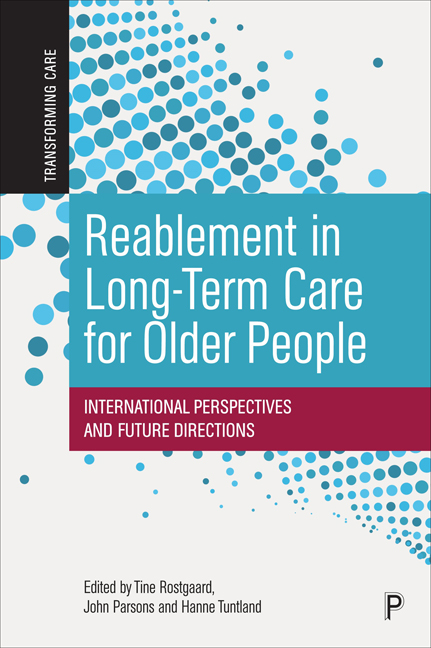8 - Reablement and dementia
Published online by Cambridge University Press: 18 January 2024
Summary
Introduction
Dementia is the leading cause of dependency and disability among older individuals (World Health Organization, 2012). While the reablement approach is increasingly being integrated in aged care, this has not been taken up in dementia care to the same extent (or at least, the take-up has not been documented). Therefore, the aim of this chapter is to show the possibilities for providing reablement for individuals living with dementia. We will describe how individuals living with dementia can benefit from reablement and some of the possibilities and challenges in providing reablement to this user group.
This chapter begins with a short description of what dementia is and how the disease can impact on an individual's ability to participate in everyday living activities. We discuss how theoretical understandings of dementia developed in the late 20th century support a reablement approach to care for this population group. Dementia specific principles, techniques, and reablement intervention programs are presented to show that reablement in dementia care is possible and can be effective. Specifically, a literature search of published work regarding reablement intervention programs designed for individuals living with dementia was conducted, and readers are provided with examples of these intervention programs and descriptions of the impact these programs have had on individuals participating in them. Finally, the discussion is used to highlight some of the challenges in accessing reablement intervention programs for this population group.
Dementia interferes with an individual's ability to do everyday activities
Dementia is an umbrella term used to describe a collection of symptoms associated with multiple diseases impacting the brain (World Health Organization, 2012). It causes deterioration in thinking skills, sometimes referred to as ‘cognitive abilities’, which impacts on an individual's ability to participate in everyday tasks and be functionally independent (World Health Organization, 2012). While dementia is not a normal part of ageing, it primarily presents in individuals aged over 65 (Livingston et al, 2017). The most common cause of dementia is Alzheimer's disease (Burns and Iliffe, 2009). Other dementias include frontotemporal, Lewy body, vascular, and mixed dementia (Burns and Iliffe, 2009).
- Type
- Chapter
- Information
- Reablement in Long-term Care for Older PeopleInternational Perspectives and Future Directions, pp. 163 - 188Publisher: Bristol University PressPrint publication year: 2023



